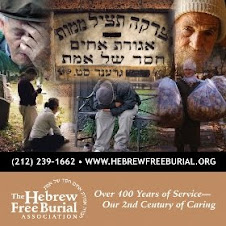Several years ago, YAHOO came under scrutiny for not giving parents access to their deceased son's e-mail. Their son, a United States soldier, was killed in Iraq, and they hoped to retrieve his e-mails. YAHOO argued that giving the parents access would be in violation of their privacy policy. After negotiations, the parents eventually received access to their son's e-mails.
When putting together documents for my safety deposit box, this story came to mind. I decided to include a document with my user names, passwords, and access codes, for important websites I frequent; my e-mail, banking, investments, etc..,. If G-d forbid, something should ever happen, I would want my family to have access to my e-mail, especially since my e-mail could just as well be my auto-biography. All my e-mails are saved, and one after the other, they tell the story of my life, what I've done, what I'm doing, and what my thoughts are on different topics.
Last week, I saw an article on MSNBC that touched on this issue. Methods to inform one's online community upon your death. Online communities are a new reality for many, and its important to remember our online lives when preparing for our real world end.


No comments:
Post a Comment